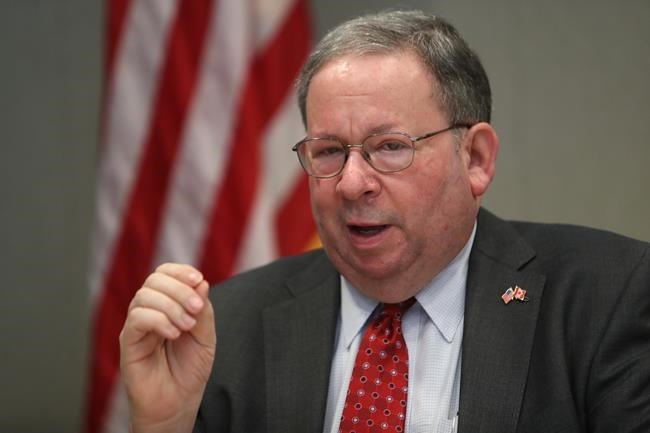OTTAWA — Shortly before his president announced new sanctions against Russia, and a short walk from the aftermath of the antigovernment protests that paralyzed Ottawa and key border crossings, the American ambassador to Canada saw a connection.
U.S. Ambassador David Cohen said Tuesday the evolving Russia-Ukraine crisis and the so-called trucker protests also share a common trait — both are examples of how Canada and the United States are determined to fight the threats of authoritarianism and hate speech.
Cohen said that commitment is a crosscutting pillar in the road map for relations between the two countries to which President Joe Biden and Prime Minister Justin Trudeau agreed one year ago at their first meeting after the American president assumed power.
"If there's a lesson that comes out of the trucker blockade, it is how do we continue to engage in and enhance the dialogue that we're having around the importance of democracy, as compared to authoritarian regimes like Russia," Cohen said in an interview on Tuesday.
"We have a predisposed platform to be able to take on the hateful speech that we saw in the demonstration, as two countries working together and as leading the world to tell the story about why hate speech is not the way out," he added.
"Working together and respecting each other and respecting all peoples is the best way to proceed, and to build alliances, commercial alliances and defence alliances."
Cohen was speaking in Ottawa hours before Biden's announcement that the U.S. had ordered heavy sanctions against Russian banks and business leaders, some of the so-called oligarchs close to President Vladimir Putin.
Canada and the United States are fully aligned on a set of sanctions that will inflict pain on Putin and other high-level Russians if he further invades Ukraine, said Cohen.
As he signed a new executive order, Biden said "the beginning of the Russian invasion of Ukraine" had begun after Russian troops had crossed into rebel-held territory in eastern Ukraine.
"They will be incredibly painful. We continue to emphasize that there is a diplomatic route to avoid this crisis, and that we're giving Russia every opportunity to accept diplomacy and conversation instead of conflict and sanctions," said Cohen.
"And I think Canada is fully aligned in designing a set of sanctions that will have the same impact."
Later Tuesday, Prime Minister Justin Trudeau announced Canada was sending hundreds more troops to eastern Europe and imposing new sanctions on Russia.
Cohen also was speaking from a U.S. embassy boardroom that was less than a city block from where empty Ottawa streets remained barricaded under police guard after being cleared in a major law enforcement sweep on the weekend.
The so-called "freedom convoy" exposed Canada's vulnerability to foreign influence as internet fundraising accounts showed massive amounts of money pouring in from foreign jurisdictions to finance the protests, led by U.S. donors.
The Trudeau government has targeted that financing as part of its invocation of the Emergencies Act, which has given it the power to freeze bank and credit card accounts of organizers.
The federal New Democrats called for Cohen to testify before the House of Commons foreign affairs committee to discuss the American funds but the request was defeated by the governing Liberal members on the committee, as well as the Conservative opposition.
Asked whether the two countries needed to co-operate more on dealing with the flow of money across each other's borders, Cohen said: "I'm not prepared to say that that is a priority for the United States."
Cohen said the demonstrations that occurred in Canada were typical of the populist uprisings on display across the world.
"These are uprisings by people who are angry at government, who don't like government, who don't like large institutions, and who come together to try and achieve usually very broad objectives, up to and including changing control of the government, which is really exactly what the convoy demonstrations appeared to be about," said Cohen.
"Along the way, this particular demonstration had a short term, but very negative, impact on trade between the United States and Canada."
The Canadian side of the Ambassador Bridge, which connects Windsor and Detroit, was blocked for about a week by protesters, before police cleared them away. The bridge is one of the busiest land trade routes in the world, and its shutdown raised alarm bells in Washington.
Cohen said that in his short time in Canada — he was confirmed for the post by the U.S. Congress late in 2021 — he has seen a far more pervasive sentiment that supports people from diverse backgrounds, including the rights of Indigenous Peoples than some of the vitriol that was on display in the Ottawa protest.
"I have some personal experience in this space. And I'm a big believer in the principle that the best way to fight speech that you find offensive, and that you don't agree with, is with more speech on the other side of that speech," he said.
"I take the lesson from the trucker demonstration, the importance of raising our voices in favour of the democratic principles of our two countries."
This report by The Canadian Press was first published Feb. 22, 2022.
Mike Blanchfield, The Canadian Press



